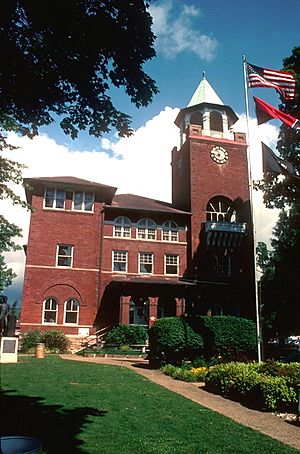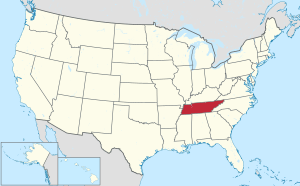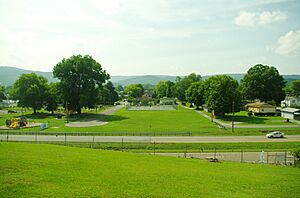Rhea County, Tennessee facts for kids
Quick facts for kids
Rhea County
|
|
|---|---|

The Rhea County Courthouse, site of the Scopes Trial
|
|

Location within the U.S. state of Tennessee
|
|
 Tennessee's location within the U.S. |
|
| Country | |
| State | |
| Founded | 1807 |
| Named for | John Rhea |
| Seat | Dayton |
| Largest city | Dayton |
| Area | |
| • Total | 336 sq mi (870 km2) |
| • Land | 315 sq mi (820 km2) |
| • Water | 21 sq mi (50 km2) 6.3%% |
| Population
(2020)
|
|
| • Total | 32,870 |
| • Density | 101/sq mi (39/km2) |
| Time zone | UTC−5 (Eastern) |
| • Summer (DST) | UTC−4 (EDT) |
| Area code | 423 |
| Congressional district | 4th |
Rhea County (pronounced RAY) is a county in the state of Tennessee, USA. In 2020, about 32,870 people lived there. The main town and government center is Dayton. Rhea County is part of a larger area that includes cities like Chattanooga and Cleveland.
Contents
Exploring Rhea County's Past
Rhea County is named after John Rhea, a politician from Tennessee and a veteran of the American Revolutionary War. The county has a rich history, including important events from the American Civil War and a famous court case.
The Trail of Tears in Rhea County
In the 1830s, a sad event called the Trail of Tears happened. The United States government forced many Cherokee people to move from their homes. Part of their journey went right through Rhea County.
Rhea County During the Civil War
During the American Civil War (1861-1865), Rhea County was different from most of East Tennessee. While many in East Tennessee supported the Union (the northern states), Rhea County strongly supported the Confederate side (the southern states).
In 1861, Rhea County was the only county in East Tennessee that did not send a representative to a meeting that supported the Union. When Tennessee voted on whether to leave the United States, Rhea County voted to secede. The county also sent many soldiers to fight for the Confederate Army.
The Rhea County Spartans: A Unique Cavalry Unit
Rhea County was home to a very special group called the Rhea County Spartans. This was the only group of female cavalry (soldiers on horseback) on either side during the Civil War! It was formed in 1862 by young women from the county.
At first, the Spartans mostly visited their loved ones fighting in the war. They brought them care packages, like gifts from home. But after Union troops came into Rhea County in 1863, the Spartans might have helped the Confederate forces by gathering information.
In April 1865, the Spartans were arrested by Union supporters in Rhea County. They were made to march to the Tennessee River and then taken by boat to Chattanooga. Once there, Union officers realized the women were not a threat. They were released and allowed to go home, but only after they promised to be loyal to the United States government. The Spartans were never an official part of the Confederate Army.
Moving the County Seat to Dayton
For a long time, the county seat (the main town for government) was in a community called Washington. But in 1890, it was moved to Dayton. This happened for several reasons, including the completion of a new railroad that connected Cincinnati and Chattanooga, and the fast growth of Chattanooga.
The Scopes Trial: A Famous Court Case
One of the most famous events in Rhea County's history is the Scopes Trial, which happened in 1925. This trial was about a law in Tennessee that made it illegal to teach about evolution in public schools.
The trial became known as the "trial of the century" because it was so important and talked about. A famous lawyer named William Jennings Bryan was part of the prosecution (the side trying to prove guilt). He sadly passed away in Dayton shortly after the trial ended. Today, there is a statue of Bryan at the Rhea County Courthouse.
Rhea County's Geography and Nature
Rhea County covers about 336 square miles. A small part of this area, about 21 square miles, is covered by water.
Mountains, Rivers, and Lakes
Walden Ridge, which is part of the Cumberland Plateau, forms the western border of Rhea County. The Tennessee River makes up the eastern border. This river is very important to the county.
Near Spring City, the Watts Bar Dam crosses the Tennessee River. The part of the river above the dam is called Watts Bar Lake, and the part below is called Chickamauga Lake. There is also a nuclear power plant, the Watts Bar Nuclear Generating Station, located near the dam.
Major Roads
The main north-south road in Rhea County is U.S. Route 27. Important east-west roads include State Route 30, which crosses US-27 in Dayton, and State Route 68, which connects Spring City to other towns.
Neighboring Counties
Rhea County shares borders with several other counties:
- Cumberland County (to the northwest)
- Roane County (to the northeast)
- Meigs County (to the east)
- Hamilton County (to the south)
- Bledsoe County (to the west)
Protected Natural Areas
Rhea County is home to several beautiful state protected areas, including:
- Chickamauga Wildlife Management Area (part)
- Cumberland Trail (part)
- Hiwassee Refuge (part)
- Laurel-Snow State Natural Area
- Piney Falls State Natural Area
- Stringing Fork Falls State Natural Area
- Yuchi Refuge
People and Population of Rhea County
| Historical population | |||
|---|---|---|---|
| Census | Pop. | %± | |
| 1810 | 2,504 | — | |
| 1820 | 4,215 | 68.3% | |
| 1830 | 8,186 | 94.2% | |
| 1840 | 3,985 | −51.3% | |
| 1850 | 4,415 | 10.8% | |
| 1860 | 4,991 | 13.0% | |
| 1870 | 5,538 | 11.0% | |
| 1880 | 7,073 | 27.7% | |
| 1890 | 12,647 | 78.8% | |
| 1900 | 14,318 | 13.2% | |
| 1910 | 15,410 | 7.6% | |
| 1920 | 13,812 | −10.4% | |
| 1930 | 13,871 | 0.4% | |
| 1940 | 16,353 | 17.9% | |
| 1950 | 16,041 | −1.9% | |
| 1960 | 15,863 | −1.1% | |
| 1970 | 17,202 | 8.4% | |
| 1980 | 24,235 | 40.9% | |
| 1990 | 24,344 | 0.4% | |
| 2000 | 28,400 | 16.7% | |
| 2010 | 31,809 | 12.0% | |
| 2020 | 32,870 | 3.3% | |
| U.S. Decennial Census 1790-1960 1900-1990 1990-2000 2010-2014 |
|||
As of the 2020 census, Rhea County had 32,870 people living in 12,177 households. Most residents (about 87%) identify as White. There are also smaller populations of Black or African American, Native American, Asian, and people of mixed races. About 6% of the population is Hispanic or Latino.
Learning and Education in Rhea County
Rhea County has a strong focus on education, with several schools and colleges.
Public Schools
Most students in Rhea County attend schools run by the Rhea County Schools system. This system includes:
- Three elementary schools
- Two middle schools
- Two schools that teach students from kindergarten through 8th grade (K-8)
- One high school, Rhea County High School
- One alternative school
Rhea Central Elementary is currently the largest K-8 school in Tennessee. The city of Dayton also has its own K-8 school, Dayton City School, for children living within the city limits. All public high school students in the county attend Rhea County High School, which has about 1,500 students.
Private Schools
Rhea County Academy is a private school in Dayton for students from pre-kindergarten (K4) through 12th grade. It started in 2003 and has about 150 students.
Colleges and Universities
Rhea County is also home to several colleges:
- Bryan College: A four-year Christian college located in Dayton, named after William Jennings Bryan.
- Chattanooga State Community College: Has a small campus in Dayton.
- Oxford Graduate School: An international Christian college for adult students, also located in Dayton.
Towns and Communities

Rhea County has one city and two towns, along with several smaller communities.
City
- Dayton (the county seat)
Towns
Unincorporated Communities
These are smaller communities that are not officially organized as cities or towns:
Former Community
Famous People from Rhea County
Several notable individuals have come from Rhea County:
- Archie Butler (actor): An actor, stunt man, and crew member in many films and TV shows, born in Rhea County in 1911.
- Hargus "Pig" Robbins: A famous American keyboard and piano player for recording sessions, born here in 1938.
- Arnim LeRoy Fox, known as Curly Fox: An American old-time and country fiddler, singer, and musician, born here in 1910.
- John Randolph Neal Jr.: An American attorney, law professor, politician, and activist, born here in 1876.
- May Erwin Talmadge: The 19th President General of the Daughters of the American Revolution.
Images for kids
-
The Rhea County Courthouse, site of the Scopes Trial
-
View of Dayton from Cedar Glen Lane
See also
 In Spanish: Condado de Rhea para niños
In Spanish: Condado de Rhea para niños
 | Chris Smalls |
 | Fred Hampton |
 | Ralph Abernathy |






